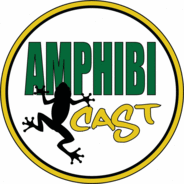For the past few decades, Chytrid has had a profound effect on amphibian populations worldwide. In Panama, species within the Atelopus genus have been particularly effected. Thankfully though, new strategies are being developed to mitigate disease.This week I am joined by Brian Gratwicke of the Smithsonian National Zoo and the Panama Amphibian Rescue and Conservation Project . Brian is also the Co-Chair of the IUCN amphibian disease specialist group. We discuss some of the strategies being developed to combat disease in fragile wild Atelopus populations, captive breeding and husbandry protocols used to maintain assurance colonies, and the significant role that skin bacteria plays as a defense against disease.For more information visit: https://nationalzoo.si.edu/about/staff/brian-gratwickeTo support the show by becoming a Patron, for AmphibiCast Merch, for a 10% listener discount off In Situ Ecosystems Vivariums, and to support Panamanian Frog Conservation, visit https://linktr.ee/AmphibiCast

Wissenschaft & Technik
AmphibiCast Folgen
AmphibiCast is the Original Amphibian Focused Podcast. Each weekly episode features informative and educational content for hobbyists, naturalists, ecologists, pet enthusiasts and anyone who appreciates frogs, toads and salamanders.
Folgen von AmphibiCast
205 Folgen
-
Folge vom 02.12.2022Episode 116. Amphibian Disease Mitigation Strategies with Brian Gratwicke
-
Folge vom 23.11.2022Episode 115. Amphibian Pathology and Parasitology with Dr. Robert "Oz" OssiboffAs amphibian medicine continues to advance, so has our understanding of what constitutes proper captive husbandry. practices. Both hobbyists and conservationists place tremendous value in the lives of their frogs and both will often (if not always) look for answers when death or illness present in their collections. Since many amphibian illnesses cannot be detected by the naked eye, in these cases we must rely on a pathologist to help us find out the answers.This week I am honored to be joined by Dr. Robert "Oz" Ossiboff. Oz has the unique distinction of being one of the few veterinary pathologists who specializes in amphibians here in the US, and in this episode we discuss how pathology and parasitology are essential parts of proper husbandry protocols. We talk about how and why necropsies and fecal exams are performed, how parasites and diseases can be detected and diagnosed under a microscope, and we discuss some real life case studies. Oz is also an accomplished dart frog hobbyist, and we discuss his approach to keeping from a vet's perspective. To learn more please visit: https://www.vetmed.ufl.edu/profile/ossiboff-robert/To support AmphibiCast by becoming a patron, for merch, for a 10% listener discount off In Situ Ecosystems vivariums, and to support Panamanian Frog Conservation visit: https://linktr.ee/AmphibiCast
-
Folge vom 18.11.2022Episode 114. Poison Frogs of the Cordillera Sira With Josh AllenThis week I am joined once again by Josh Allen. Josh has years of experience as a guide and naturalist in Peru, and he has a special interest in poison frogs. We discuss some of the impacts that habitat destruction and gold mining have on Peruvian Dendrobatids within the Cordillera Sira, his encounters with some of the rarer species of ranitomeya, and how to identify suitable wild ranitomeya habitat. We also talk about the importance that a certain type of soil plays in the lives of wild poison frogs and the ultra rare and habitat-specific species - Excidobates mysteriosus.To become a patron, for merch, and for a 10% discount on in situ ecosystems vivariums visit https://linktr.ee/AmphibiCast
-
Folge vom 11.11.2022Episode 113. “Effective Bioactive” - Naturalistic Approaches to Amphibian HusbandryIn this episode I discuss some of the principles and methods behind naturalistic aka bioactive keeping as it relates to amphibian husbandry. I cover how and why husbandry progressed from sterile to naturalistic, how to effectively manage waste in a naturalistic enclosure through careful planning, the importance of moisture, drainage and ventilation, and what to expect from an effective cleanup crew. To support the show by becoming a Patron, for AmphibiCast Merch, to support Panamanian Frog Conservation, and for 10% listener discounts on In Situ Ecosystems vivariums visit: https://linktr.ee/AmphibiCast
